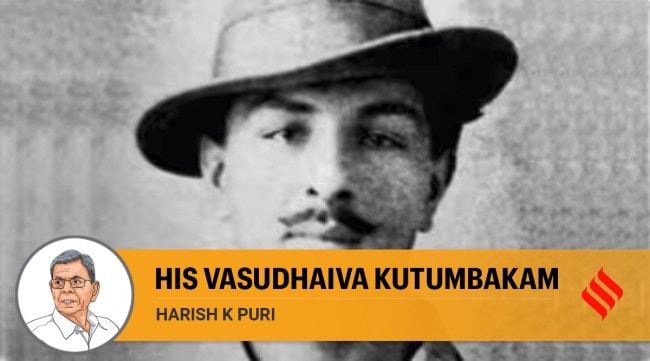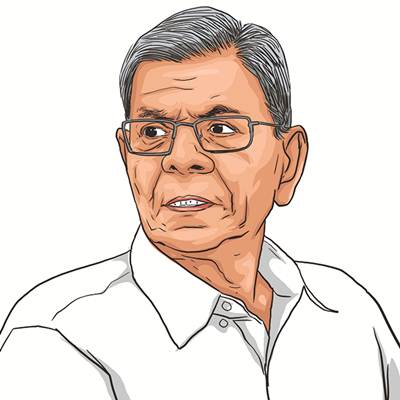Opinion For Bhagat Singh, ‘Vasudhaiva Kutumbakam’ was secular and humanist
In times of sharpening fault lines, his message of universalism has become more relevant
 Bhagat Singh elucidated his rational and critical approach in the essay, ‘Why I am an Atheist’.
Bhagat Singh elucidated his rational and critical approach in the essay, ‘Why I am an Atheist’. Early in his life, Bhagat Singh seemed to have been fascinated by the imagination of vasudhaiva kutumbakam, dreaming of the world as one family, bound by love and mutual respect. In an essay, ‘Vishwa Prem’, in the Hindi weekly Matwala in November 1924, he reflected upon the social and political challenges in the realisation of the dream. The theme of India’s G20 presidency — vasudhaiva kutumbakam — makes it relevant to look into Bhagat Singh’s thoughts on the subject on his birth anniversary, which was on Thursday.
The success in achieving a consensus in G20’s joint declaration was hailed as the moment of India’s rise on the world stage. It was also a moment of glory for Prime Minister Narendra Modi, who reiterated that India’s vision was “not just a slogan, but a comprehensive philosophy, derived from our cultural ethos.” “The world is already taking note of India’s human-centric model of development, an inclusive development, which guided the government’s outlook within India and towards the world too,” PM Modi said. Given the country’s complex social and political realities, one cannot help but ask if the PM was really honest about such an egalitarian transformation in the outlook and politics of his government and party.
Bhagat Singh raised such a question in ‘Vishwa Prem’. He asked: “Looking at the existing conditions, could anyone believe that such an imagined time will come.” In several articles, he grappled with the problems of communalism, hatred and violence, oppression, poverty, untouchability and casteism. The reality, as he stated, was that “merely to belong to a religion is now considered enough reason to be the enemy of another religion.” There should be no division such as we have between touchable and untouchable, “but the Sanatan Dharma is in favour of this discrimination,” Bhagat Singh said. Does this ring a bell?
Bhagat Singh elucidated his rational and critical approach in the essay, ‘Why I am an Atheist’. He suspected, rightly, that several so-called social reformers took a superficial political position. He ridiculed stalwarts like Madan Mohan Malviya for not being honest about removing untouchability and asked: “Vey log jo ‘vishavbandhuta’ ka ghor naad kiya karte hain, kya vastav mein usey laaney ke ichhuk hain? (Do those who are beating the drums of universal brotherhood, really want to bring about such an order?)”
Today as we remember the great martyr, can we ignore the harsh reality that the Indian society is riven by communal and caste hatred, fear and violence? The corporate capitalist path of economic development has created more inequality in addition to the deeply entrenched inequality of caste. We have not paid heed to the sharp warning delivered by Babasaheb Ambedkar on November 25, 1949 — a day before the Constitution was adopted.
The fault lines in our country are deep. A vitriolic and provocative attack on Sanatan Dharma (not the Hindus) was made by a Tamil leader. A call was then given by the Prime Minister to prepare “to fight” such “forces” “who are pushing the country into a thousand years of slavery.” These two actions point towards a condition of civil strife. So do the references by highly-placed leaders to “tukde tukde gangs” and calls like “desh ke gaddaron ko”. We are witness to an uninhibited demonisation of the “other”. The use of terms like “termites” for migrants, the inflammatory messages at a Dharam Sansad of sadhus and sants and the impunity enjoyed by them raise doubts about the sincerity of our resolve towards vasudhaiva kutumbakam. Do we realise that the weaponisation of nationalism and the project of making India a Hindu Rashtra goes against the grand theme of G20?
To win over the hearts and minds of people who have diverse and conflicting interests, we need Gandhian dedication towards love, compassion and non-violence. The G20 declaration “deplored all acts of religious hatred” and asserted “it was time to end trust deficit and herald an era of cooperation”. It’s time to align lofty thoughts with practice on the ground.
Denouncing hypocrisy, Bhagat Singh wrote; “Aye vishvbandhuta, vishvabandhuta, chillanewale! Kya tum uskey liye tayyar ho? Yadi nahin to aaj sey is dhong ko chhor do! (O’ you who shout cries of world brotherhood! are you really determined to strive for that? If not, then stop this hypocrisy)”. Hypocrisy is said to be a tribute that vice pays to virtue.
After entering the new Parliament building on September 19, PM Modi declared: “We are starting a new chapter, we should forget all past bitterness.” He said, “Sirf dil chahiye, desh ke liye chahiye (we should dedicate our hearts to the country)”. If that could lead our government, leaders and the people to be honest and sincere, shedding hypocrisy and making a beginning towards vasudhaiva kutumbakam, it may be the most appropriate tribute to Bhagat Singh.
The writer is retired professor of political science and head, B R Ambedkar Chair, Guru Nanak Dev University, Amritsar






